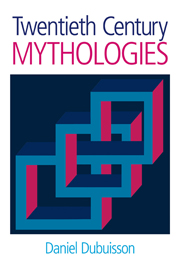Book contents
- Frontmatter
- Epigraph
- Contents
- Foreword by Professor Robert A. Segal
- Preface
- Abbreviations
- Introduction: History and comparative epistemology
- Part I Georges Dumézil, or Society
- 1 The Indo-European background
- 2 The first comparative mythologies
- 3 Durkheim, Mauss, Bourdieu, and Dumézil
- 4 The 1950s: a reorientation
- 5 Comparative and structural evidence
- 6 The new comparative mythology
- Addendum I Theory, history, and the limits of Dumézil's comparativism
- Addendum II Does a Dumézilian theory of religion exist?
- Part II Claude Lévi-Strauss, or the Mind
- Part III Mircea Eliade, or the Sacred
- Conclusion: Modern theories of myth and the history of Western thought
- Bibliography
- Index
1 - The Indo-European background
from Part I - Georges Dumézil, or Society
- Frontmatter
- Epigraph
- Contents
- Foreword by Professor Robert A. Segal
- Preface
- Abbreviations
- Introduction: History and comparative epistemology
- Part I Georges Dumézil, or Society
- 1 The Indo-European background
- 2 The first comparative mythologies
- 3 Durkheim, Mauss, Bourdieu, and Dumézil
- 4 The 1950s: a reorientation
- 5 Comparative and structural evidence
- 6 The new comparative mythology
- Addendum I Theory, history, and the limits of Dumézil's comparativism
- Addendum II Does a Dumézilian theory of religion exist?
- Part II Claude Lévi-Strauss, or the Mind
- Part III Mircea Eliade, or the Sacred
- Conclusion: Modern theories of myth and the history of Western thought
- Bibliography
- Index
Summary
An indefatigable worker and reader, as well as a prolific writer, Georges Dumézil (1898–1986) never imagined that the life of a scholar would yield any outcome other than the edification that comes from his work, since through it alone, he asserted, his existence metamorphosed into destiny. In Dumézil's eyes, intellectual work and the written word were absolutely essential. Nevertheless, the highly unusual breadth of his work is stupefying: several dozen volumes composed in approximately sixty years, from 1924 to 1986. His youthful illusions, despite his superior gifts, were brutally dashed by the First World War, but his sceptical, doubting spirit sought and found in intellectual adventure an elegant and fitting answer (as others later remarked) to the desperation and absurdity of the time. His personal life, carefully guarded and subordinated in every respect to his immense labour, can be reduced for our purposes to a few dates that punctuate the twentieth century and trace the progress of an exemplary if not ideal career.
In 1916 Dumézil enrolled as an honours student in the École Normale Supérieure in Paris; and in 1919, following a few months’ active military service at the front, he returned to graduate with a teaching degree (agrégé). His chosen area of study was Classics, which he may later have regretted, as he became certain that literary studies could never result in the sort of immortal perfection that accompanies the rigorous analyses of phonological systems or the humblest mathematical theorem.
- Type
- Chapter
- Information
- Twentieth Century Mythologies , pp. 7 - 16Publisher: Acumen PublishingPrint publication year: 2006

